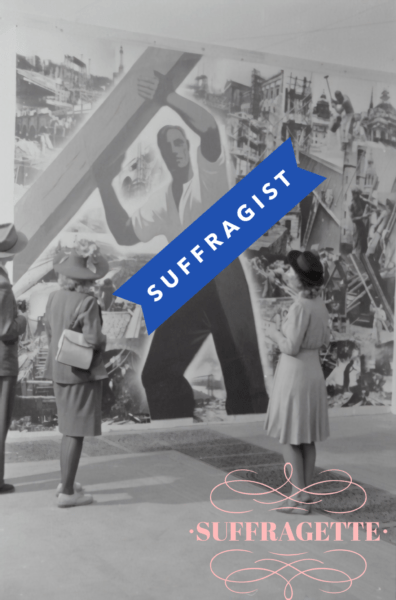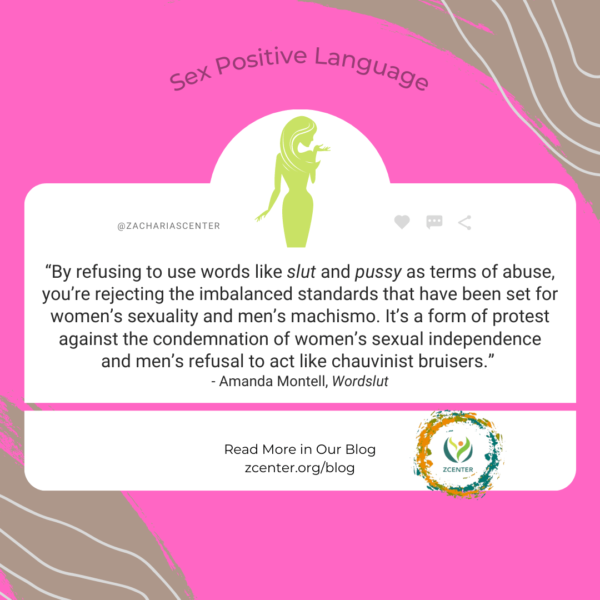A rape crisis center focuses primarily on supporting survivors of sexual assault, but we also strive to further systemic change around sexual violence through prevention and education. What does a culture without sexual violence look like? It values consensual sex; it honors the joy and pleasure that humans find in their sexuality. As we work to end sexual violence in our culture, part of that work is to promote sex positive narratives. For the month of May, the ZCenter blog is looking at sex positive culture and our role in it. We start here by exploring language (American English) and how language and sexuality shape each other.
Language is constantly changing; it evolves with the living community. Just within the last week, an Alabama bill was signed that removes anti-gay language from sex education. We know that language changes as our understanding of sexuality becomes more complex and we also know that our choices in language help to shape the changes that we want to see in society. We offer a brief overview of sexuality and language by looking into semantics, morphology, and discourse analysis.
Semantics
 “‘Vagina’ is itself an insult. In Latin the word means ‘scabbard’, that is, ‘sword sheath’” (Greer, 2020, p.2); a female’s sexual anatomy is defined only by what a man can store there. A puritanical view of sex has been built into our language, ingrained into our very vocabulary. Our own bodies are turned against us as insults. “By refusing to use words like slut and pussy as terms of abuse, you’re rejecting the imbalanced standards that have been set for women’s sexuality and men’s machismo. It’s a form of protest against the condemnation of women’s sexual independence and men’s refusal to act like chauvinist bruisers” (Montell, 2020, p.48). Montell adds other terms that are too often used as abuse: bitch, old maid, spinster, queer, dyke, nasty woman, cunt, and ho. Some folks are reclaiming these words, as a way to reject old standards of femininity (p.39). Do we want to reclaim all of these insults? Do we want slut, a word that punishes women for enjoying sex, to be used at all? Modern women grapple with this issue and still find no clear answer.
“‘Vagina’ is itself an insult. In Latin the word means ‘scabbard’, that is, ‘sword sheath’” (Greer, 2020, p.2); a female’s sexual anatomy is defined only by what a man can store there. A puritanical view of sex has been built into our language, ingrained into our very vocabulary. Our own bodies are turned against us as insults. “By refusing to use words like slut and pussy as terms of abuse, you’re rejecting the imbalanced standards that have been set for women’s sexuality and men’s machismo. It’s a form of protest against the condemnation of women’s sexual independence and men’s refusal to act like chauvinist bruisers” (Montell, 2020, p.48). Montell adds other terms that are too often used as abuse: bitch, old maid, spinster, queer, dyke, nasty woman, cunt, and ho. Some folks are reclaiming these words, as a way to reject old standards of femininity (p.39). Do we want to reclaim all of these insults? Do we want slut, a word that punishes women for enjoying sex, to be used at all? Modern women grapple with this issue and still find no clear answer.
We need to recognize that intermingling gendered and sexual language into verbal abuse is a harm the cuts deeply: “(H)aving someone accuse you of doing your gender badly often feels like the worst insult of all, because it tells you that you’ve failed at a fundamental part of who you are” (p. 38). Also, as children grow up and hear sexual terms used as insults, it automatically places sexuality into a negative light, particularly women’s sexuality. When we see that a man being called a women’s sexuality term (pussy, e.g.) as one of the lowest insults in the culture, we know something is wrong. It’s time to intervene when we hear our own body parts used as insults.
Cursing is too often a contributing factor in a sex negative culture. In fact it is one of three categories of cursing: sex, scatology, and religion. Cursing in the sex category includes terms like fuck, dick, and cunt (Montell, 2020, p. 196). Any sexual act or descriptor can become a curse word in the right context. Once again, we relegate sexual acts to that which is insulting and/or intending to cause harm. However, Montell reminds us that “you can curse without insulting” (p.196). Is there a difference between Fuck the patriarchy and Uhg, the fucking patriarchy? In a world where we want to end sexual violence, we need to be more conscious of our word choice, particularly of how our language perpetuates a rape culture. But we also want to be sex positive and affirm healthy, consensual sex in our language. Similarly, with the word gay, we as a culture are moving away from using the word as an insult and honoring the word as a self-identifier that promotes a healthy sexual identity. Gone are the days when Michael Scott can get away with calling coworkers gay as an insult.
Morphology
 Morphology is the study of parts of words, including how affixes, conjugations, and other word parts function. For example, a linguist notices that angriness is a misuse of morphemes; we already have a noun, anger, that expresses the same meaning. Adding -ness to angry is unnecessary.
Morphology is the study of parts of words, including how affixes, conjugations, and other word parts function. For example, a linguist notices that angriness is a misuse of morphemes; we already have a noun, anger, that expresses the same meaning. Adding -ness to angry is unnecessary.
We can be conscious of how morphemes help or hinder a sex positive culture. We know that suffixes -ette and -ess distinguish words to describe women, and usually in a way that delineated an insult or an assumption that this new word is less than the original. Suffragette was first coined as a way to delegitimize female suffragists; similarly, actress, waitress, and stewardess all refer to women only, distinguishing them from the norm (Eckert & McConnell-Ginet, 2013, pp. 85-86). We have a flood of terminology emerging, words that take away the male normalization: waitstaff/server, actors, folks, service worker, postal worker, flight attendant, etc.
We can also be more conscious of the suffix –y. Crazy, slutty, dirty, and bitchy are all terms that anyone can use to insult a woman, specifically if she shows an interest in sexual pleasure and/or assertiveness. Do we use these words often? Do we intervene when we hear them? Do we talk within our social circles about how or if we want to reclaim these terms?
Discourse Analysis
Analyzing larger chunks of language and how we make choices about language is discourse analysis. Sexuality is discursively constructed, meaning our sexual identity is closely tied to the language we use. In fact, one’s ideology can support feminist values but their discourse might reveal more traditional roles (Kendall & Tannen, 2018).
What are some ways that discourse analysis helps us recognize more sex positive language?
1.Politeness. We don’t talk about sex in polite company, not even with our children. Also, the “kinds of ‘politeness’ used by and of and to women do not arise by accident; that they are, indeed, stifling, exclusive, and oppressive” (Lakoff, 2004, p. 102). In the workplace, women often “assume a warm manner; use humor, and allow themselves to be the objects of humor; and otherwise attend to the face needs of subordinates by using ‘mitigated commands, forms of politeness, and indirect engagement’” (Kendall & Tannen, 2018, p. 652). Sex positive language means that we stop valuing politeness above justice and equity. Our children deserve to learn about sex properly and our society deserves to talk openly about something we all do.
 2. Euphemisms. We use euphemisms to talk about sex positively, because our society still does not accept overt talk of sex in polite conversation. We can say hooking up, Netflix and chill, or gettin’ some; but to openly discuss our happiness about our own sex lives is still considered taboo. Even on one of television’s most openly sexual series, Sex and the City, Charlotte still preferred See You Next Tuesday to cunt (IMDB, 2021).
2. Euphemisms. We use euphemisms to talk about sex positively, because our society still does not accept overt talk of sex in polite conversation. We can say hooking up, Netflix and chill, or gettin’ some; but to openly discuss our happiness about our own sex lives is still considered taboo. Even on one of television’s most openly sexual series, Sex and the City, Charlotte still preferred See You Next Tuesday to cunt (IMDB, 2021).
3. Hedging. We soften our language with phrases like “kind of, sort of, maybe, I think and others” (Parker & Mahlstedt, 2010, p. 144). “I kind of feel horny” communicates that the speaker’s sexuality is not very important. In a sex positive culture, we would openly and directly communicate our needs and desires, because they matter.
4. Normalizing Heterosexuality. “The purpose of a man is to love a woman, and the purpose of a woman is to love a man” (Wayne Fontana and the Mindbenders, 1965). The lyrics to the song The Game of Love illustrate just how pervasive the heterosexual norm was many years ago. Has the narrative changed since 1965? We certainly see more representation of the LGBTQIA community in pop culture, but we also have the same normalization of heterosexuality in our language. Consider the following interactions that are commonplace:
A: “My junior bought their prom outfit.”
B: “Oh, tell me all about her dress! Which boy asked her?”
In this example, we see speaker B immediately jump into heteronormative assumptions about clothing, dating, and pronoun usage, and this is a very typical interaction among many parents.
A: “My boss invited us to a company lunch this weekend.”
B: “Oh, and is his wife the hostess? I wonder if she is catering or cooking it all herself?”
Again, we see speaker B slip into heteronormative language with assumptions about the gender of a boss, their spouse being a woman, and the woman’s significant contribution being a domestic task.
As we go about our day-to-day lives, we can be more conscious of how we use language to either support the heteronormative language around us, or to support the sexuality and identity of all.
5. Online language. In terms of language used online, men use more crude language, including insults, profanity, and adversarial stances toward others (Kendall & Tannen, 2018, p. 652-3). We know that cyber aggression enforces social norms and also establishes social hierarchies (Felmlee et al, 2020). Women are insulted and harassed online if they ever step outside of the social norm for female behavior; women are told to be submissive, quiet, polite, and caring. When we assert ourselves, even worse, our sexuality, we are harassed and bullied (See more at Felmlee et al, 2020). But we can create safe online spaces and we can be active bystanders who intervene when we see this language behavior online.
Societal Change
Can changing our language change societal norms? This was a question Robin Tolmach Lakoff asked in 1975. She found that word choice, tone, politeness, even cursing are approached differently by men and women (Lakoff, 2004). As we look into next steps for sex positive language, let’s keep these thoughts in mind:
- Use your words. “If there’s no name for it, it’s as if the phenomenon does not exist” (Parker & Mahlstedt, 2010, p. 142). Just as we have added terms like date rape, acquaintance rape, and affirmative consent to our lexicon, we can add more ways to describe sex in a positive light. We can continue to move toward a more sex positive discourse with terms like consent, kink, and body acceptance.
- Keep the euphemisms flourishing. We need to start with small steps toward positive sex talk, even if it’s just Netflix and chill. In situations where it feels inappropriate to use overt sexual language, let’s at least keep the euphemisms alive!
- Stop hedging. Stop being polite. Let’s be direct in our communication when it comes to our own sexuality. Let’s not be afraid to assert our needs and desires.
- Family talk when children are young is how we are socialized into how we view sex (Kiesling, 2019, p.115). Check back in next week as explore this topic of parent and caregiver language on the topic of sex positivity.
References
Eckert, P. & S. McConnell-Ginet. (2013). Language and Gender, Second Edition. Cambridge University Press.
Felmlee,D., P.I. Rodis, & A. Zhang. (2020). Sexist Slurs: Reinforcing Feminine Sterotypes Online. Sex Roles. 83:16–28 https://link.springer.com/content/pdf/10.1007/s11199-019-01095-z.pdf
Greer, G. (2020). On Rape. Hachette Australia.
Internet Movie Database (IMDB). (2021). Sex and the City Quotes. https://www.imdb.com/title/tt0159206/quotes/?tab=qt&ref_=tt_trv_qu
Kendall, S. & D. Tannen. (2018). Discourse and Gender, in The Handbook of Discourse Analysis, 2nd Ed. (Ed. D. Tannen, H. Hamilton, D. Schiffrin). Willey Blackwell.
Kiesling, S.F. (2019). Language, Gender, and Sexuality: An Introduction. Routledge.
Lakoff, R.T. (2004). Language and Woman’s Place: Text and Commentaires, Revised and Expanded Edition. Mary Bucholtz (Ed.). Oxford University Press.
Montell, A. (2020). Wordslut: A feminist guide to taking back the English language. Harper Wave.
Parker, J.A. & D. Mahlstedt. (2010).Language, Power, ane Sexual Assault: Women’s Voices on Rape and Social Change. Language in the real world. Behrens, S. J., & Parker, J. A. (Eds.). Routledge. 139-163.
Wayne Fontana and the Mindbenders. (1965). The Game of Love. https://www.oldielyrics.com/lyrics/wayne_fontana_and_the_mindbenders/game_of_love.html (accessed 2021).
Written by Kristin D. Jones, Ph.D., Ed.M., Outreach Supervisor
All ZCenter blog posts are written by state certified staff, interns, and volunteers. For questions on authorship or content, please email kjones@zcenter.org.

